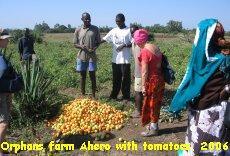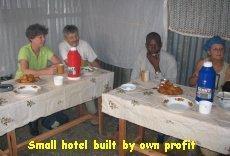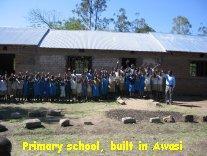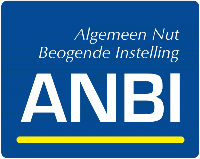Erkenningspaspoort
English summary
Home
Actueel nieuws
Projecten
∑ coŲperatieve bedrijven
∑ individuele bedrijven
∑ huttenbouw
∑ schoolfonds
∑ microfinanciering
Algemene informatie
∑ jaarplan
∑ activiteiten
∑ reisverslagen
∑ financiŽle verslagen
∑ werkwijze en donaties
∑ beleidsplan
∑ nieuwsbrieven
Duka matin
Contact / info bank
Links
English Summary
STICHTING
STEUNFONDS KENYA PROJECT ETTEN-LEUR THE NETHERLANDS
Intention
of the Kenya Project
When
Mrs Rentia Krijnen-Hendrikx from Etten-Leur in The Netherlands heard
from Mill Hill's father Alfons Geerts
that widows from the LUO-tribe near Lake Victoria, are being inherited
by their brothers in law or their family,
she was shocked to learn about this, since there were a lot of abusive
things going on.
There is a way out for a widow, but only if she is economical
independent. She then must take care of herself and her children.
As
a widow in The Netherlands Rentia received a small pension. She and her
three children inherited the possessions from her late husband.
Realizing
what a difference there was, Rentia decided to start helping widows who
did not like to be inherited and who wanted to be their own boss,
without being some kind of slave of their in-law.
So, it started in Ahero with small amounts of money for assisting those
widows to become independent.
Slowly the help expanded.
Year after year there were more widows asking for help and we managed
to do just that.
Nowadays
we help widows and their children in 13 villages and in the small
adjacent villages by renewing their huts, or when they are beyond
repair, building new ones. We provided oxen and ploughs, in some cases,
even an acre of land to grow food. Not only for themselves, but also to
sell on the local market to earn some money.
Up till now we have given help to more than 1600 widows and a lot of
children.
Give us the means to become
independent; we'll make a job of it.
"With
this project, the dignity of our mothers is given back to them", wrote
Simon. He once was a student and a son of Eunita, a widow in Ahero.
Eunita was one of the ten founding mothers who started in 1988
micro-finance in Ahero, in the province Nyanza in west Kenya.
Now, almost 30
years later the words spoken by her son Simon, still apply.
In
all the widow groups - roughly scattered round the north-eastern side
of Lake Victoria- you find them, widows who are working hard to make
ends meet, not only for themselves but also for the children they take
care of. There are quite a lot of them who –besides their own - take
care of family orphans as well, due to fatal diseases like HIV.
They do not complain but are working hard to get at least a decent meal
on the table.
The Kenya Project helps out.
I.e. they do not buy fish for them in the market, but a rod, a string
and a hook, so they can provide for themselves.
With
help from people who are supporting us with grants and donations we are
able to improve the living conditions of the widows. We help them to
establish one person businesses , also cooperative businesses. They
even put in some of their own money which they have earned with market
sales, or microfinance interest. The main goal is always to make steps
forward, to get a better life for them and their children. In other
words, we helped them with means, they put in working force, and we
assure you, it is not easy working in the blazing sun.
Each village has a board,
chosen by the local members. They make their own decisions. The
thirteen villages are guided by two general coordinators who are
familiar with the widows and the Kenya Project. They get a small
allowance which is paid by the Kenya Project in The Netherlands.
Mrs
Norah Anyango and Mrs. Anne Adera are the general coordinators . It
is due to their difficult work that the projects in Kenya are doing
quite well actually.
Norah |
 Anne |
Important in this project is:
∑ Widows make their own plans for businesses.
∑ Members of the Dutch board visit the projects in Kenya
mostly two times a year together with donors.
∑ All costs for those visits are fully paid by those who are
visiting Kenya.
∑ The Dutch board members take this information back home to
judge whether the proposals are viable and
if it is worth spending money on.
∑ Widows account for all the money they spend by showing
receipts and administration. Profits can make
new businesses.
History: native houses,
cooperative business, school fees, a guesthouse and small projects
Six
years from the start the request came to the Kenya Project to assist
widows to repair houses or to build a new house for the widow and her
children. Up until 2016 we built or repaired 900 houses.
After
nine years, the question came to help the widows establish cooperative
businesses. Their plans were: posh-mills, shallow wells, small hotels,
oxen and ploughs, cows, a guesthouse et cetera.
Out of the profits
of the crop fields, they bought hundreds of goats and they started new
small projects. Nice to see during our visits, that these projects can
be successful. Needless to say that there are failures too, together we
search for the reason why it did not work the way it was intended. If
that can improve we start again, if not, we look for another small
project, or just stop.
 |
 |
 |
In
2000 the request reached the Kenya Project if we could also assist with
school fees. The widows also take care of orphans (mostly out of their
family) next to their own children. We decided to do this and we
founded a school fund in the Netherlands. From that school fund we
nowadays pay examination fee for the children in class eight, and we
pay school fee for children in the secondary school. We stimulate the
widows to send not only their sons to school, but also their daughters.
Education is a great weapon against poverty and ignorance. We only
support students with a higher education when there is a donation for
that purpose.
In 2003 we opened a guesthouse in Awasi. We started to
build two schools and seven shallow wells.
 |


